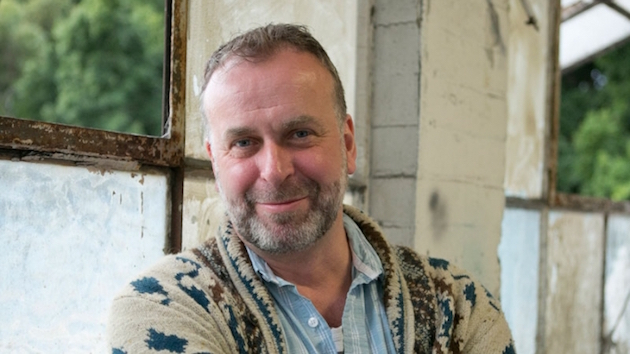
Overheard recently at a popular Bay Area eatery, two women were discussing the upcoming S.F. Opera season. One had recently returned from the season at Santa Fe; her companion, speaking in a frail voice with labored breath, stated emphatically: “I’m going to see Andrea Chénier. That’s all. I love Andrea Chénier.”
This is a beloved opera for a good reason. It fills the ears and swells the heart.
At bat to make this woman’s operatic experience a home run is David McVicar, the Scottish director whose productions are mainstays at the Royal Opera Covent Garden, Glyndebourne, the Metropolitan Opera, and whose productions of Don Giovanni, Il trovatore, Les Troyens, and Die Meistersinger have been mounted here in San Francisco. In the era of jet travel and short rehearsal periods, singers often voice their respect and appreciation for the enthusiastic and erudite director, who is known for taking the time to help them energize and inform their performances. As soprano Taryn Fiebig of Opera Australia put it: “His understanding of the context of the speech at the time and how that affects everything is the best I’ve ever experienced. It’s a nuance, an understanding … he goes straight to the text and the truth of the text and you find where you used to slap on a bit of showmanship … you don’t need any of that.”
What this amounts to at a practical level in rehearsal is reportedly a physical dynamism coupled with a willingness to slam the brakes on if he doesn’t feel the moment the singer is giving him is authentic. Working on his own terms has garnered McVicar a smorgasbord of praise and attack from the press over the years, but having first turned down an opportunity to work at the Met (reportedly due to dissatisfaction with a proposed designer) he is now running at the top of their leaderboard, the man in whose experienced hands they placed productions of Donizetti’s trilogy of operas on English queens.
Previous productions in San Francisco were remounted without his on-site guidance — though not due to any unwillingness on his part, he emphasized — so McVicar is quite pleased to finally be here in San Francisco in person. He arrived for our interview in the opera’s press room moving at a furious pace that one imagines will not subside until after opening night, if then.
You’ve said that your understanding of being a director comes from having been a very bad actor.
No, I’m actually quite a good actor, I just say that. [Smiles] I didn’t want to act. I trained as an actor because I found the process so interesting. But I knew very quickly that’s not what I wanted to do. I wanted to stand outside. The aspect of directing, particularly in opera, which is being a teacher, I found very rewarding. Not with every singer. There are some cases you can’t help, but when you can unlock something in a singer, when you can really help someone overcome dramatic weaknesses, or when you hear someone say, “that tenor? He’s terrible, he can’t act!” and I can make that tenor act, I really enjoy that.
What is your personal process like, in advance of rehearsal?
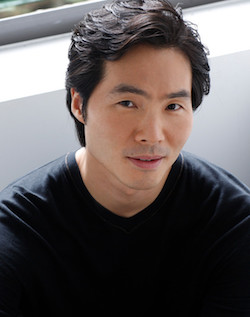
I get to know the opera as well as I can. The dogmatic process is repeated listening to the opera. I don’t have an instrument, so I can’t play it so I have to listen. And I listen and listen and listen and listen, and I carry on listening. I listen to as many recordings as I can to get as many nuances and as many approaches so I’m not locked into one interpretation. And by the time I hit the floor, generally speaking, I don’t need to look at the score, I know it. For the cast, I think that makes them feel very safe.
You can’t predicate too much until you’ve met the singers. You can if you’ve had a hand in the casting. At Covent Garden or Glyndebourne or the Met, usually I’ll have quite the major hand in the casting so a lot of the singers are known quantities. Like here in San Francisco, Yonghoon Lee is the tenor and we’ve done many things together; we’re very good friends, we like each other very much. We trust each other absolutely, and that’s a really good starting point.
You said once about singers: “I think they’re used to coasting. I pull them up all the time. If I can see there’s no motivation behind an action, I say, ‘Stop it, stop it’.”
I did it last night. I said, “stop, stop, stop! You look like you don’t know what you’re doing. Do it again!” There shouldn’t be one second on stage where anyone is fuzzy about why they’re there. I can’t stand opera performances where I can tell and you can tell that it’s been thrown on stage with no thought other than I move from that point to that point and then I find a really nice position to sing a high B. I can’t stand that laziness.
If we’re talking about opera of this period, they’re not just writing chances for singers to sing high Bs. There’s a reason. The repertoire we’re still performing is wonderfully composed for a dramatic reason. Giordano is a second-ranked composer but he meant this. He meant every note of this. Some people think Puccini is a second-ranked composer. I don’t, because I think as a dramatist he’s right up there with the best of them.
What is your definition of “faithful to the score?”
That’s very subjective. In what aspect?
Your Aida, for example.
I hear Aida as a very dark piece. It’s quite an intimate piece, despite everyone’s expectations that it’s all about grandeur. Its principal themes are lives crushed by church, state, and warfare, which doesn’t come across if you stage it like a 1920s Egyptian pageant. The other thing about Aida, which I don’t think was understood when I did it in London, is it never looks like ancient Egypt. Ancient Egyptians didn’t wear much and that’s not generally speaking a good look for opera singers, so what Aida always looks like is a fancy dress party [of the] 1920s or, worse, a 19th-century Egyptology camp thing and I think that approach belittles the seriousness of Verdi’s score.
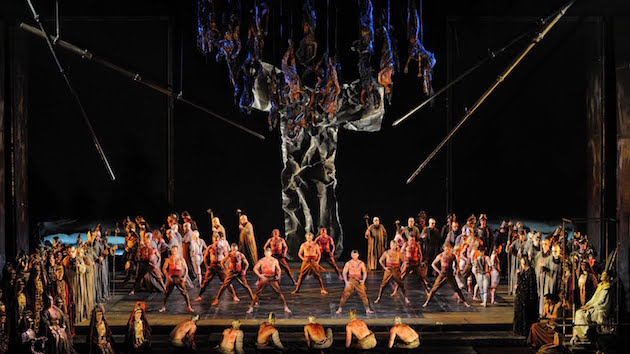
Verdi rated the score of Aida very highly in his own works, which I struggled with a bit because I’d only seen hokey-kokey productions. It wasn’t until I was asked to do it and really studied it and spent time with it that I realized how wonderful it was. But I perceived it as a dark piece, a violent piece, a sexual piece. Amneris’s unbridled sexual longing for Radames is everyone’s undoing. Do you treat that as an operatic convention or do you take it incredibly seriously? Do you take the issue of warfare incredibly seriously? Do you take the issue of how terrifyingly in control the priests are seriously, or not? So, that Aida ended up being very controversial. We did have some booing. And I hate that. But an old Italian came up to me in a café a several days after the premiere, and I was feeling pretty bruised about how horrible the English critics had been about the show because we were really proud it. Everyone was really proud of it. And he said, “thank you. I was a child during Mussolini. Someone understands Aida, how really frightening this story is.” So that was nice.
Very early on, over a decade ago, you said you had a problem with Verdi’s women. What changed that for you?
I think that problem is more to do with the depiction of women generally in art in the 19th century. I think that’s really what I’m talking about.
The depiction as victim?
The eternal victim. Or the redemptive women. There have been lots of studies, especially by feminist authors, into this subject. One of the things I find perplexing about a character like Violetta is, she’s denied her sexual aspect. It’s not depicted. It’s not there. And she’s a courtesan, for God’s sake. When I came to do Traviata I did find a way to circumnavigate that and to restore that aspect of her character. For instance, I’ve just come from a production of Così [fan tutte] in Australia and the two girls and Despina and I were talking a lot about how frank the sexual language of the women actually is, and that’s a joyous thing. That’s a very empowering thing for those characters, if the singers can recognize it. That’s something that’s going to vanish in the 19th century, so I think that’s what I was trying to say there.
Is there a composer whose worldview you feel the most affinity with, in terms of what really makes people think, feel, and do as they do?
Mozart. Mozart is like Shakespeare. Mozart is like the world. Every Mozartean character is seen in 360 degrees. Not every Verdian character is. Some Verdi characters are quite flat. You need to flesh them out to find other dimensions. But even Barbarina in [The Marriage of] Figaro is completely rounded and completely convincing as a character. Because I’ve done a lot of Mozart, and I’ve done a lot of the same titles in different productions, and the wealth of detail you can explore and the new things you can discover each time you come back to a piece like Figaro and [Don] Giovanni — it’s remarkable.
This opera (Andrea Chénier) is inevitably compared to Tosca. Does that bother you, the comparing, rather than seeing each piece for its own qualities, or do you want to settle this and say yes, it’s as good as Tosca?
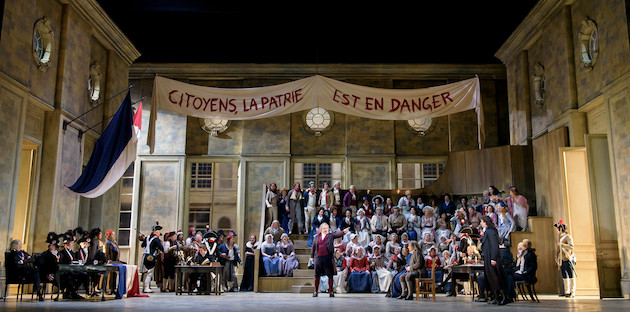
It’s not as good as Tosca. It’s a very, very good opera of the second rank. It’s not as well composed as Tosca. It doesn’t have the concision of Tosca, because Puccini’s dramatic instincts, he was much more on the ball than Giordano, who was a much less sophisticated man. So [Luigi] Illica was sort of unbridled in his libretto, so sometimes the libretto gets quite obscure, and over-wordy and poetical. Puccini goes to the chase and most of the operas, he knows exactly what the emotional thread is. That’s why he fought with Illica all the time, because Illica thought himself to be a very major, great writer.
What [Chénier] is, is fantastically, crudely in a sense, theatrical. It holds the stage. It’s finally very moving, very thrilling. It’s not a greatly sophisticated piece, but it doesn’t matter. It still deserves respect and it still deserves everybody onstage to do their best.
Is it a treat, in a way, to work on a piece that is done a bit less often, because the singers don’t have perhaps quite as fixed an idea of character because they haven’t done the role a hundred times before?
Yep. There’s nothing more depressing than when a singer comes and says, “no, no, no, she’s very beautiful here.” I had a Traviata once, a second cast, and I went up to her and said, “darling, you can’t wear those false eyelashes in bed when you’re dying?” And she said, “but she’s very beautiful here.” I went online and found pictures of someone dying of tuberculosis and said, “that’s what you should look like.” I won the battle of the eyelashes.
Maybe that’s where singers and actors are different.
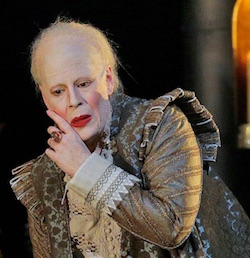
Well, it depends on the singer. What I did to Sondra Radvanovsky at the Met in Roberto Devereux last season, people were a bit shocked that I aged her up as much as we did. That reaction was about, “but the soprano should be beautiful.” But she’s playing the truth of the character. Elizabeth is 70 years old. And Sondra loved it. She spent an hour in makeup before she even warmed up. The latex aging and everything. She just adored doing that role.
Would you like to see the standard repertoire expand?
Yes. Something I’m quite worried about now, and this is an international phenomenon, is marketing departments are having quite a say in what is being scheduled in seasons and I think that’s a very dangerous route. I think a balanced season should be some sure-fire popular hits, a modern piece, a new piece, some more fringe pieces, and then something like a revival of a Handel opera. It’s like humans having the same thing for dinner every day. I think it really should be a banquet of delicious and wonderful and different things, and every single title should be given the same care. Even if it’s Bohème. Don’t throw Bohème on in seven days. I can tell if Bohème has been done in seven days and I can tell if it’s been done in three weeks.
Do you think at all in terms of your legacy of productions?
No, no, no. I just can’t stand the “Ah! It’s time to give the world my Tristan!” The debate about production style — a lot of time audiences are unhappy about production style — and I am too when I see some work, particularly in Germany, because what I’m detecting is a director saying, “I have to make my mark with this piece. I have to do something that will never be forgotten.” And I think that’s such a dull way of proceeding because I think we should approach the operas with more humility than that. All of us. And I think our goal should be to get it right. I think that’s what we should be trying to do. How do we get this right? I really do. That doesn’t mean we’re subservient to the operas. We’ve still got a myriad of interpretive choices we can make, but what interpretive path we choose should be to light the piece up, not obscure it. This makes me incredibly unfashionable in Europe. I just have to suck that one up. I have to accept that. I’m not perceived as being particularly trendy.
You look like that’s OK with you.
I don’t care. [Laughs.] As long as I’ve got some work and I can still express myself as an artist, I’m OK with that.

